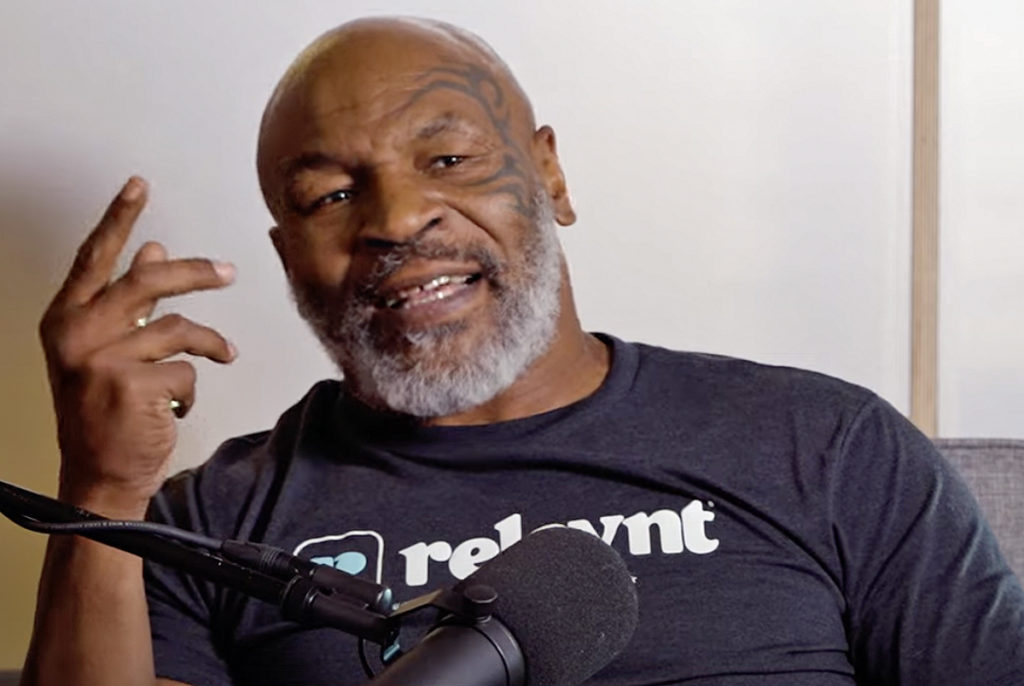Let's Talk About Mike Tyson And The Myths Surrounding Him
Mike Tyson is one of those larger-than-life figures who has dominated headlines for decades, both in the boxing ring and in his personal life. Known as one of the most ferocious and skilled boxers of all time, Tyson’s career has been nothing short of legendary. But with fame comes scrutiny, and over the years, the media and public curiosity have delved into aspects of his life that go far beyond his achievements in the ring. One topic that keeps popping up, whether we like it or not, is the question of Mike Tyson’s, well, "size." Now, before you roll your eyes, let’s take a moment to unpack why this topic even exists and what it says about our society. This article will separate fact from fiction, dig into the cultural implications, and remind us all why respecting personal boundaries is crucial.
As a global icon, Mike Tyson has been under the microscope for as long as anyone can remember. From his early days as a kid from Brooklyn who rose to become the youngest heavyweight champion in history, to his later years as a public figure navigating controversies and personal growth, Tyson’s life is a story of resilience and complexity. Fans admire his knockout power and strategic brilliance in the ring, but human nature being what it is, people also can't help but wonder about the more private aspects of his life. And let’s face it—curiosity is part of being human. But where do we draw the line?
Here, we’re going to explore the topic of Mike Tyson’s alleged... measurements—not to sensationalize or invade his privacy, but to understand why this kind of conversation happens in the first place. We’ll look at the broader societal trends that drive these discussions, the importance of respecting personal boundaries, and how all of this ties into our cultural obsession with body image and masculinity. By the end of this article, you’ll not only have a clearer understanding of why this topic exists but also how it reflects the way we think about fame, privacy, and what it means to be a man in today’s world.
Read also:How To Build A Thriving Online Business In 2023
Table of Contents
- Biography of Mike Tyson
- The Persistent Rumors About Mike Tyson's Size
- How the Media Amplifies These Myths
- Why Privacy Matters, Even for Celebrities
- What Science Says About Size
- Societal Perceptions of Masculinity and Size
- Size and Health: Separating Fact from Fiction
- Wrapping It Up: Final Thoughts
- What You Can Do
- Sources and References
Biography of Mike Tyson
From Brooklyn to the Boxing Ring: Tyson’s Early Life and Career
Let’s rewind to the beginning. Mike Tyson was born on June 30, 1966, in Brooklyn, New York, a place where life wasn’t easy for a lot of kids. Growing up in tough neighborhoods, Tyson faced challenges that would’ve broken many people, but he had a spark inside him—a raw talent for boxing that quickly caught the eye of trainers and coaches. Enter Cus D'Amato, the legendary boxing coach who saw potential in the young fighter. Under D'Amato’s guidance, Tyson transformed into a force to be reckoned with. By the time he was just 20 years old, Tyson had achieved something no one else had: he became the youngest heavyweight champion in history. That title alone cemented his place in boxing lore, but it was his style—aggressive, fast, and devastatingly effective—that made him a legend.
Who Is Mike Tyson Outside the Ring?
While Tyson’s achievements in the boxing world are undeniable, his personal life has been just as eventful. To give you a quick snapshot:
| Full Name | Michael Gerard Tyson |
|---|---|
| Date of Birth | June 30, 1966 |
| Place of Birth | Brooklyn, New York, USA |
| Height | 5'10" (178 cm) |
| Weight | Approximately 218 lbs (99 kg) during his boxing career |
The Persistent Rumors About Mike Tyson's Size
Now, let’s get to the elephant—or should I say, the topic—in the room. One of the most persistent rumors swirling around Mike Tyson is the speculation about his, uh, "endowment." It’s the kind of thing that seems so random and irrelevant, but it’s out there, and it keeps coming up. Why? Well, partly because of our natural curiosity about public figures, partly because the media loves a good scandal, and partly because the internet has a way of amplifying even the most trivial gossip. Despite the lack of any real evidence, these rumors persist, fueled by online forums, social media posts, and the occasional tabloid headline.
Why Do People Even Care About This Stuff?
- Curiosity About Public Figures: Let’s be honest—we’re fascinated by the lives of celebrities, athletes, and anyone in the public eye. It’s human nature to want to know more about the people we admire, but sometimes that curiosity crosses into areas that should stay private.
- Sensationalism in Media: The media has a knack for turning small stories into big headlines, especially if they involve shock value. Sensational headlines grab attention, but they don’t always tell the whole truth—or any truth at all.
- Social Media Amplification: Platforms like Twitter, Reddit, and Instagram have made it easier than ever for rumors to spread like wildfire. Once something gets out there, it’s hard to stop it, even if it’s completely baseless.
How the Media Amplifies These Myths
The media plays a huge role in shaping how we perceive the world—and sometimes, that perception isn’t entirely accurate. In the case of Mike Tyson, certain outlets have contributed to spreading myths about his personal life, including the whole "size" thing. Sensational headlines and tabloid stories often prioritize entertainment over accuracy, leading to misinformation that sticks around long after the original story has faded. It’s a vicious cycle: the media sensationalizes, the public consumes, and the rumors grow stronger.
How Can We Stop the Spread of Misinformation?
- Critical Thinking: Encourage yourself and others to question what you read. Is the source credible? Is there evidence to back up the claims? A little skepticism goes a long way.
- Responsible Journalism: Journalists and media outlets have a responsibility to report facts accurately and ethically. When they prioritize sensationalism over truth, they do a disservice to their audience and the people they’re writing about.
- Public Awareness: Educating people about the dangers of spreading unverified information is key. The more we understand how misinformation works, the better equipped we are to combat it.
Why Privacy Matters, Even for Celebrities
Let’s talk about something fundamental: privacy. Everyone deserves it, whether they’re a world-famous boxer or just your average Joe. For someone like Mike Tyson, whose life is constantly in the spotlight, maintaining privacy can feel impossible. Discussing private matters, like, you know, his anatomy, without his consent not only invades his personal boundaries but also perpetuates harmful stereotypes and societal norms. It’s time we start treating public figures like people—with dignity and respect.
Why Privacy Should Be a Priority
- Respect for Individuals: Respecting someone’s privacy is a basic human right. It’s about acknowledging their autonomy and treating them with decency.
- Mental Health Implications: Constant public scrutiny and invasion of privacy can take a toll on mental health, especially for those who are already dealing with public criticism or judgment. It’s not easy being in the spotlight all the time.
- Social Responsibility: As a society, we have a responsibility to promote empathy and understanding. We can—and should—do better when it comes to respecting the privacy of public figures.
What Science Says About Size
So, let’s get scientific for a moment. If you’re wondering about the average size of, well, you know what, science actually has some answers. According to a study published in the British Journal of Urology International, the average penis size for adult males ranges from about 3.61 inches (9.17 cm) when flaccid to around 5.16 inches (13.11 cm) when erect. That’s a pretty wide range, and it shows that there’s no "normal" size—just normal variation. Size isn’t a measure of masculinity or personal worth, and it’s time we all started seeing it that way.
Read also:The Inspiring Journey Of Zulma Aponte Shimkus
Key Findings from the Study
- Average flaccid length: 3.61 inches (9.17 cm)
- Average erect length: 5.16 inches (13.11 cm)
- There’s a lot of variation between individuals, and that’s perfectly normal.
Societal Perceptions of Masculinity and Size
Society has a weird habit of putting pressure on men to conform to certain standards of masculinity, and size is one of those things that gets way too much attention. These perceptions can lead to anxiety, self-doubt, and even mental health issues for men who feel like they don’t measure up. But here’s the thing: masculinity isn’t defined by physical attributes. It’s about character, resilience, and how you treat others. By challenging these outdated stereotypes and promoting a more inclusive understanding of what it means to be a man, we can create a healthier cultural narrative.
Breaking Down Harmful Stereotypes
- Challenging Masculinity Norms: Let’s encourage discussions about the many ways masculinity can be expressed, beyond just physical traits. Being a man is about so much more than what you look like.
- Promoting Body Positivity: We need to foster a culture where everyone feels comfortable in their own skin, no matter what society says. Embracing diversity in all its forms is key to creating a more accepting world.
- Education and Awareness: Educating people about the science behind body diversity and dispelling myths about size can help reduce stigma and promote understanding.
Size and Health: Separating Fact from Fiction
While size might be a topic of curiosity, it’s important to understand its relationship with overall health. For most men, size isn’t a determinant of sexual health or function. Things like hormonal balance, lifestyle choices, and psychological well-being play a much bigger role in maintaining sexual health. If you’re concerned about your health, talking to a healthcare professional is always the best course of action.
When Should You See a Doctor?
- Concerns About Functionality: If you’re experiencing issues related to sexual function or discomfort, it’s a good idea to consult a healthcare professional. They can provide personalized advice and solutions.
- Psychological Impact: Anxiety or self-esteem issues related to body image can be addressed through therapy or counseling. Talking to someone can make a huge difference.
- Regular Check-Ups: Prioritizing routine health screenings is always a smart move. Staying on top of your health ensures that you’re taking care of yourself in every way.
Wrapping It Up: Final Thoughts
In conclusion, the whole conversation about Mike Tyson’s size is more than just a random topic—it’s a reflection of broader societal trends around curiosity, privacy, and media sensationalism. While it might seem trivial on the surface, it highlights important issues about respecting personal boundaries and challenging harmful stereotypes. By promoting empathy, critical thinking, and responsible media consumption, we can create a more informed and respectful society.
Remember, when it comes to public figures, the focus should always be on their accomplishments and contributions, not on private aspects of their lives. Let’s celebrate Mike Tyson for what he’s achieved in the ring and beyond, and leave the rest to him.
Article Recommendations


